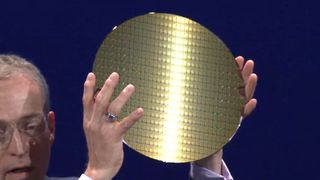Intel’s well-documented issues with its high-end 13th-gen and 14th-gen CPUs crashing or being generally unstable with PC games could cast a cloud over sales of the firm’s next-gen Arrow Lake CPUs.
Or it is the warning from a motherboard maker following the ongoing saga that has been dragged out over the course of this year, with complaints from Core i9 processor owners and various advice from Intel, including recommended settings for mitigation and a recent BIOS fix. (The latter addressed a bug in the microcode for the Enhanced Thermal Velocity Boost feature of these CPUs, which Team Blue admitted could contribute to the crashing issues).
At any rate, Wccftech reports that ZDNet in Korea has spoken to a representative of an unnamed motherboard manufacturer who, under cover of anonymity, raised concerns about how this whole episode could impact Intel’s next-gen desktop CPU sales.
They are quoted as saying: “If the stability issue is not clearly resolved, consumer distrust will increase, and sales of ‘Arrow Lake,’ a new processor for desktop PCs that Intel plans to release in the fourth quarter, will decrease.”

(Image credit: Intel)
Analysis: The danger of tainted perception for Intel
Obviously, we must take this report with a good deal of caution, but really – is this revelation surprising? We’d argue that it isn’t, although what is surprising, or certainly unusual, is that a motherboard maker would come forward with such a statement – sprinkle seasoning as noted – underlining the gravity of the situation as it has unfurled.
Indeed, we’re struggling to remember a more confusing and thorny hardware-related issue in more recent PC history. Fingers of blame have been pointed here and there, while gamers who’ve spent a lot of money on top-end silicon have been suffering at the hands of crashes, which have undoubtedly been very frustrating.
While the problem has been resolved in a fashion, root causes still haven’t been nailed down precisely and the mentioned mitigations have a performance trade-off that enthusiasts who buy the likes of Intel’s Core i9 desktop processors are not going to be happy with, either. Although clearly, dropping some frames is a better alternative to persistent instability when gaming.
{ window.reliablePageLoad.then(() => { var componentContainer = document.querySelector(“#slice-container-newsletterForm-articleInbodyContent-x7eyoMEfa6UqVpwxLwR429”); if (componentContainer) { var data = {“layout”:”inbodyContent”,”header”:”Get daily insight, inspiration and deals in your inbox”,”tagline”:”Sign up for breaking news, reviews, opinion, top tech deals, and more.”,”formFooterText”:”By submitting your information you agree to the Terms & Conditions and Privacy Policy and are aged 16 or over.”,”successMessage”:{“body”:”Thank you for signing up. You will receive a confirmation email shortly.”},”failureMessage”:”There was a problem. Please refresh the page and try again.”,”method”:”POST”,”inputs”:[{“type”:”hidden”,”name”:”NAME”},{“type”:”email”,”name”:”MAIL”,”placeholder”:”Your Email Address”,”required”:true},{“type”:”hidden”,”name”:”NEWSLETTER_CODE”,”value”:”XTR-D”},{“type”:”hidden”,”name”:”LANG”,”value”:”EN”},{“type”:”hidden”,”name”:”SOURCE”,”value”:”60″},{“type”:”hidden”,”name”:”COUNTRY”},{“type”:”checkbox”,”name”:”CONTACT_OTHER_BRANDS”,”label”:{“text”:”Contact me with news and offers from other Future brands”}},{“type”:”checkbox”,”name”:”CONTACT_PARTNERS”,”label”:{“text”:”Receive email from us on behalf of our trusted partners or sponsors”}},{“type”:”submit”,”value”:”Sign me up”,”required”:true}],”endpoint”:”https://newsletter-subscribe.futureplc.com/v2/submission/submit”,”analytics”:[{“analyticsType”:”widgetViewed”}],”ariaLabels”:{}}; var triggerHydrate = function() { window.sliceComponents.newsletterForm.hydrate(data, componentContainer); } if (window.lazyObserveElement) { window.lazyObserveElement(componentContainer, triggerHydrate); } else { triggerHydrate(); } } }).catch(err => console.error(‘%c FTE ‘,’background: #9306F9; color: #ffffff’,’Hydration Script has failed for newsletterForm-articleInbodyContent-x7eyoMEfa6UqVpwxLwR429 Slice’, err)); }).catch(err => console.error(‘%c FTE ‘,’background: #9306F9; color: #ffffff’,’Externals script failed to load’, err)); ]]>
Sign up for breaking news, reviews, opinion, top tech deals, and more.
So, with that in mind, is it believable that this debacle could dent the computing public’s confidence in Intel’s CPUs? We think it’s possible, and logically, if Intel doesn’t come up with a definitive solution relatively soon, this could cast shadows of doubt for those looking at Arrow Lake for a next-gen CPU.
While not everyone has been affected by these gremlins by any means, the complaints are numerous enough, and the controversy will have registered without a doubt. And even though Arrow Lake is a very different beast to current Raptor Lake Refresh CPUs from Intel – and looks like it will take power usage down to a tamer level, anyway – that won’t matter to the average PC buyer, most likely. Never mind relative power consumption figures, the danger is they’ll just have heard chatter along the lines of “well don’t buy Intel they’re unstable” or similar sentiments, which could be quite damaging for Team Blue.
We shall see, but Intel is already on the back foot in the battle of the best CPUs for the next generation, given that Ryzen 9000 CPUs are now imminent, and there’s even the prospect that AMD’s 9000X3D models – which will be great for gamers – could turn up before Arrow Lake does later in 2024 (or at least around the same time).

